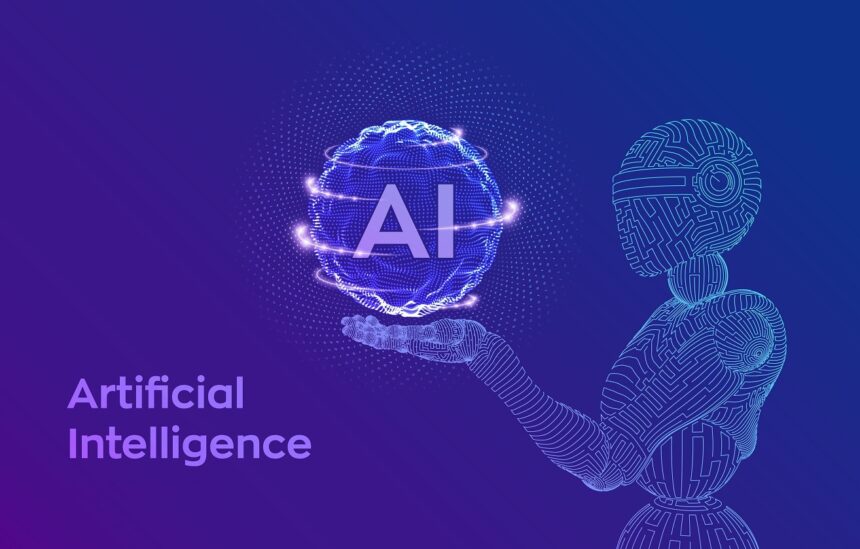Riding the Wave of Innovation: A Deep Dive into the Future of Artificial Intelligence
The talk about artificial intelligence (AI) has changed a lot from being a science fiction idea to something real that is changing quickly. The question is no longer if AI will change our world, but how and how deeply. As a top tech blogger, I’ve been following the progress of AI for years. What I see coming in 2025 and beyond is nothing short of amazing. It’s not just about making gadgets smarter; it’s about changing the way our industries, economies, and even our daily lives work. In this in-depth look, we’ll go to the heart of the most important AI trends, break down the world of future tech, and figure out the unstoppable force of innovation that is pushing us forward.
The fast pace of AI development, which is driven by huge datasets, complex algorithms, and huge increases in computing power, is creating a perfect storm of transformative potential. We are about to enter a time when AI is more than just a tool. It will be a partner, a collaborator, and, in some cases, an independent agent that can make difficult choices. The effects are wide-ranging and varied, causing both excitement and fear. Will AI help us solve some of the biggest problems facing humanity, like disease and climate change? Or will it make things worse by making new social divides and moral problems that we don’t know how to deal with?
This article will help you navigate this interesting and complicated area. We will look at not only the big-picture predictions made by top researchers and tech companies but also the real-world uses that will soon be common. We will look at the many ways that AI will affect the future of work, as well as the personalization of healthcare and education. We will also give you useful tips on how to not only understand these changes but also use AI to your advantage in your own life. So, get ready for this exciting trip into the future of AI.
The Next Frontier: Important AI Trends to Keep an Eye On
AI’s future isn’t just one thing; it’s a mix of a number of strong trends, each of which could change the world in a big way. These trends are at the forefront of AI research and development, and knowing about them is important for understanding everything that is to come.
The Growth of Multimodal and Generative AI
Generative AI, the technology behind tools like ChatGPT, DALL-E, and Google’s own Gemini, has caught the public’s attention because it can make new things. This is only the start. The next generation of generative AI will be based on multimodal models. These AI systems can read and write text, images, audio, and video in a way that is smooth and integrated.
Think about an AI model that can watch a silent movie and write a detailed script, create a fitting musical score, and even make voice-overs for the characters that sound real. This is what multimodal AI promises. This new idea will change the way creative industries work, making it easier than ever to make content that is unique to each person. This means that businesses will have to make their marketing campaigns more personalized, their educational materials more interesting, and their user interfaces easier to use. The lines between different types of media will become less clear, creating new and exciting digital experiences.
Explainable AI (XAI): Opening the Black Box
The “black box” problem has been one of the biggest obstacles to the widespread use of AI in important fields like healthcare and finance. A lot of powerful AI models, especially deep learning networks, come to their conclusions in ways that even their creators don’t fully understand. Explainable AI (XAI) is a new field that aims to make AI systems’ decision-making processes clear and easy for people to understand.
This is not only a technical problem; it is also an ethical one. A doctor or judge needs to know the why behind an AI’s recommendation in order to trust its diagnosis or risk assessment. XAI will help people trust AI systems more, make sure they are used responsibly, and make debugging and auditing easier. As rules about AI accountability get stricter, XAI will go from being a “nice-to-have” to a “must-have” for any company that uses AI in high-stakes situations. This interesting article from City, University of London goes into more detail about why ethical AI development is so important.
AI for Science and Sustainability: Solving Global Problems
The use of AI to solve some of the world’s most difficult scientific and environmental problems is probably the most exciting trend right now. Researchers in many fields are finding that AI is an essential tool that speeds up the process of discovery in ways that were previously thought impossible.
AI is being used in medicine to look at huge genomic datasets to find new drug targets, guess the structures of proteins to come up with new treatments, and make cancer treatments more effective for each patient. AI is helping to fight climate change by making energy grids more efficient, creating more accurate climate models, and helping to create materials that last.
This use of AI is strong proof of its potential as a good force, a tool that can help us create a better and more sustainable future. The World Economic Forum has shown how AI is being used to “rewrite the future of finance and financial inclusion” https://www.weforum.org/stories/2025/06/emerging-markets-future-of-finance-ai/. This is a model that can be used to solve other problems around the world.
Making AI available to everyone: tools for everyone
For a long time, only big tech companies and well-funded research institutions could make and use AI models. But this is changing quickly. Open-source AI frameworks, pre-trained models, and cloud-based AI platforms are all becoming more popular, which makes powerful AI tools available to a lot more people.
This “democratization of AI” gives small businesses, startups, and even individuals the tools they need to use AI for their own purposes. A small marketing agency can use generative AI to write great ad copy, a local store can use AI-powered analytics to make the most of their inventory, and a freelance developer can easily add advanced AI features to their apps. This trend will spark a new wave of innovation from the ground up, making the AI ecosystem more diverse and lively.
The Impact Zone: How AI Will Change Important Areas
The theoretical progress in AI is impressive, but what really matters is how it can be used in the real world. Let’s look at how these “AI trends” will lead to real changes in a number of important areas.
The Future of Healthcare: Personalized, Predictive, and Proactive
The healthcare industry is about to go through a revolution thanks to AI. AI will play a big part in changing medicine from a reactive to a proactive and personalized approach in the future.
Predictive Diagnostics: AI algorithms will look at a patient’s genetic information, lifestyle data, and electronic health records to figure out how likely they are to get certain diseases before they even show signs of them. This will make it possible to intervene early and provide preventative care, which will greatly improve patient outcomes.
Personalized Treatment Plans: AI will help doctors make treatment plans that are specific to each patient’s needs. AI can suggest the best drugs and treatments for a patient by looking at their unique biological makeup and the specific features of their disease. This helps reduce side effects and increase effectiveness.
AI-Powered Drug Discovery: Finding and making new drugs is a long and expensive process. AI is going to speed up this process by finding promising drug candidates, predicting how well they will work and what side effects they might have, and improving the design of clinical trials.
Virtual Health Assistants: AI-powered virtual assistants will be available to patients 24/7 to answer their questions, remind them to take their medications, and keep an eye on their vital signs. Patients will be able to take more control of their own health, and doctors will be able to spend more time on harder cases. SS&C Blue Prism gives us a look at this future with their predictions for AI in healthcare in 2025.
AI as a Personalized Tutor for Every Learner: A New Way to Learn
In a world that values personalized learning, the one-size-fits-all model of education is becoming less and less useful. AI could change education by giving each student a unique learning path that fits their own pace, style, and interests.
Personalized Learning Paths: Learning platforms that use AI will make unique lessons for each student based on their strengths and weaknesses. They will then give them exercises and resources that are specific to their needs. This will make sure that each student is pushed but not too much, which will help them understand more and do better in school.
Intelligent Tutoring Systems: AI tutors will be available to students 24/7 to give them feedback right away, answer their questions, and help them understand hard ideas. These AI tutors will be able to change how they teach based on what each student needs, giving them a level of personalized help that is often not possible in a regular classroom.
Automated Assessment and Feedback: AI will take care of grading tests and assignments, which will give teachers more time to have meaningful conversations with their students. AI-powered tools will also give students detailed and personalized feedback on their work, which will help them figure out what they need to work on.
Immersive Learning Experiences: AI will power immersive virtual and augmented reality learning experiences that will make subjects come to life in new and exciting ways. Students will be able to go on virtual field trips to ancient civilizations, do fake science experiments in a safe setting, and look at complicated biological systems from the inside out. Check out EIMT’s great article on the top 10 AI trends reshaping education.
The Financial Frontier: AI-Driven Insights and Security
The financial services industry has always been quick to adopt new technologies, and AI is no different. AI is already having a big effect on the world of finance, from algorithmic trading to finding fraud. AI will become even more a part of all parts of financial services in the future.
Hyper-Personalized Banking: AI will let banks give their customers very personalized products and services based on their unique financial situations, goals, and spending habits. This will make banking more proactive and focused on the customer, with banks acting as trusted financial advisors.
AI-Powered Investment Management: Robo-advisors powered by AI will give investors smart, personalized investment advice for a lot less money than traditional financial advisors. These AI-powered platforms will be able to look at market trends, figure out how much risk there is, and build and manage investment portfolios that are unique to each investor.
Better Cybersecurity and Fraud Detection: AI is a strong tool in the battle against financial crime. AI algorithms can look at a lot of transactional data in real time to find patterns that seem suspicious and spot fraud with a high level of accuracy. AI will become more and more important for keeping banks and their customers safe as cyber threats get more advanced.
Algorithmic Trading and Risk Management: AI-powered trading systems can make trades at lightning speed using complex algorithms that look at market data and find trading opportunities. AI is also being used to make risk management models that are more advanced. These models can help banks and other financial institutions better understand and reduce their exposure to market volatility and other risks. If you want to know more about this, read Uptiq’s article on the future of AI in financial services.
The Human Element: How to Deal with the Future of Work and Society
As AI becomes more common, questions will inevitably come up about how it will affect jobs and society as a whole. It’s understandable to be afraid of mass unemployment because of automation, but the truth is probably more complicated.
The job market is changing: skills are changing, not jobs are going away.
History shows that technological revolutions, even though they cause problems, usually create more jobs than they destroy. The AI revolution will probably be the same way. Some jobs, especially those that involve doing the same thing over and over again, will be automated. However, many new jobs will be created in fields like AI development, data science, and AI ethics.
A change in the skills that are in demand will be the key. Creativity, critical thinking, emotional intelligence, and working together are all skills that are unique to humans. In the age of AI, these skills will be even more valuable. In the future, workers will need to be able to work with AI systems, using their strengths and making up for their weaknesses. To get through this changing job market, you will need to be able to learn new things and change with the times. Nexford University has some useful information about how AI will affect jobs between 2025 and 2030.
Ethical Issues: Creating a Future with Responsible AI
Because AI is so powerful, it is our duty to make sure it is developed and used in a way that is fair. We need to face the fact that AI could make existing biases worse, be used for bad purposes, and violate people’s privacy.
To create a responsible AI future, researchers, developers, policymakers, and the public all need to work together. We need to set clear rules and guidelines for the ethical use and development of AI. We need to put money into research on how to make AI fair, accountable, and open. We also need to encourage people to talk about the kind of future with AI that we want to build. The Eller College of Management at the University of Arizona has a thoughtful article about the ethical issues that will affect the future of AI in business.
Useful Advice for Getting Ahead in the AI Age
The future of AI is not something that is happening to us; it is something that we are all a part of. Here are some useful tips to help you not only get through the AI era but also do well:
Develop a Growth Mindset: Being able to learn and change is the most important skill in the age of AI. Be open to learning new things and gaining new skills throughout your career by having a growth mindset.
Improve Your “Human” Skills: AI will be great at tasks that require analysis and computation, but skills that are unique to humans, like creativity, critical thinking, communication, and empathy, will become even more valuable. To stand out in the job market, work on these “soft skills.”
Learn about AI: You don’t have to be a data scientist to know the basics of AI. Learn about the different kinds of AI, how they work, and how they could be useful in your field. This will help you find ways to use AI in your own work.
Try Out AI Tools: More and more AI-powered tools are becoming available to the public, and many of them are free or cheap. Try out these tools to see what AI can do for you. This will not only help you get more done, but it will also make you think about what AI can do.
Join the Conversation: The future of AI is too important to be left to the experts. Talk to people in public about the moral and social effects of AI. Please share your ideas, ask questions, and help make a future where AI is used to help everyone.
The Beginning of a New Era: Accepting the AI Revolution
The journey into the future of AI is both exciting and scary. The AI trends we’ve looked at, like generative AI and explainable AI, aren’t just small changes. They’re big changes that will lead to levels of innovation that have never been seen before and change the way we think about future tech. These changes will affect every industry, from the hyper-personalization of healthcare and education to the change in the financial sector.
As we enter this new era, it’s important to remember that technology is just a tool. The choices we make will determine whether it has a positive or negative effect. The future of AI isn’t set in stone; we all have a part to play in making it happen. We can make sure that the AI revolution leads to a better, fairer, and more sustainable future for everyone by encouraging responsible innovation, putting ethics first, and helping people learn new skills.
There will be problems on the road ahead, but the rewards could be huge. We are all writing the next chapter in the story of AI’s future. We can not only deal with the changes that are coming, but we can also help to guide them in a way that is good for all of humanity by staying informed, being flexible, and embracing the power of this amazing technology to change things. Now is the future, and it is smart.
https://www.weforum.org/stories/2025/06/emerging-markets-future-of-finance-ai
SOURCE:



